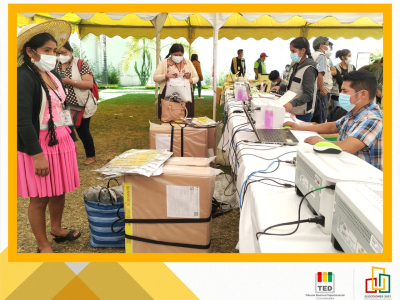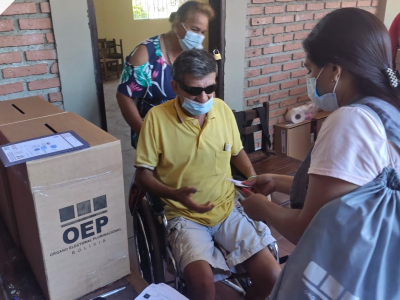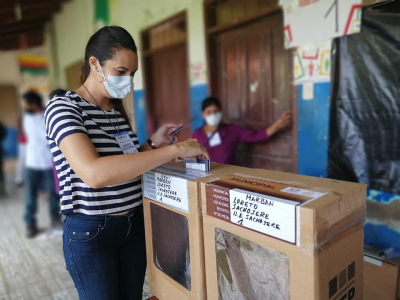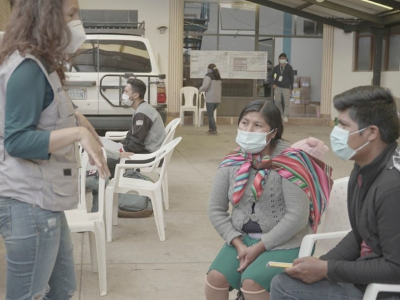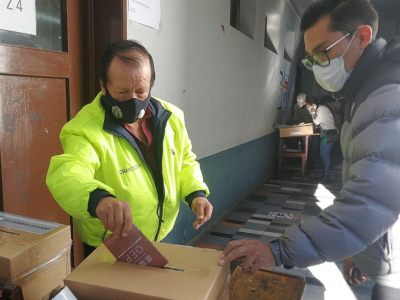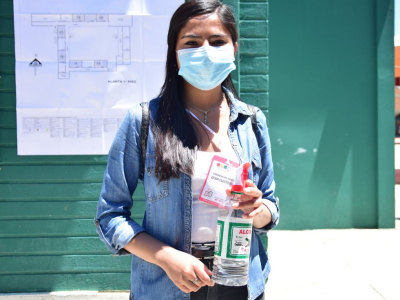| [With EMBs] Interview with Bolivian Supreme Electoral Tribunal | ||||||
|---|---|---|---|---|---|---|
| Last updated 2021-07-30 | ||||||
| Attachment | ||||||
|
Safety, Security, Supremacy (Bolivian Supreme Electoral Tribunal)
Marking the second election since the pandemic started, Bolivia had its subnational elections on 7 March. In holding the elections, the Bolivian Supreme Electoral Tribunal (TSE, by its initials in Spanish) implemented the Protocol of Health Security Measures, established by itself. The TSE was concerned with putting safety first. Based on the short interview with the TSE, along with the National Directorate of Electoral processes (DNPE) and the Plurinational Electoral Body (OEP), more details on the modifications are provided below.
▶Question: Which election(s) were held in Bolivia in 2021? ▶Answer: In 2021, the subnational elections were held on 7 March. The task was to elect 4,968 departmental, regional and municipal authorities. Details are as follows:
- Governors in nine Departmental Autonomous Governments; Deputy Governors in three of the nine departments: Santa Cruz, Tarija and Pando; Deputy Governors and leaders in the Department of Beni; Departmental Assembly Members according to the territory and population in the nine departments, and Departmental Assembly Members following their own rules and procedures. - Regional Executive, Development Executives, and Regional Assembly Members of the Regional Autonomous Government of Gran Chaco, Department of Tarija, and representatives of five Autonomous Indigenous Farming Communities (AIOC, by its initials in Spanish). - Mayors and Council members of 336 Municipal Autonomous Governments.
A total of 7,131,075 citizens cast their votes for the above elections at 5,586 polling stations across the country, under biosecurity measures, notified in advance by the Plurinational Electoral Body.
On 11 April, a second ballot (Balotaje) was held to elect Governors in the Departments of Tarija, Chuquisaca, Pando, and La Paz, among the two candidates with the highest number of votes obtained in the first round.
▶Question: How did COVID-19 change the election process and election management? ▶Answer: For elections in 2021, we applied the same Protocol of Health Security Measures, which is established by the Bolivian Supreme Electoral Tribunal (TSE), the highest authority of the Plurinational Electoral Body of Bolivia. These measures ensure security before, during, and after voting.
Considering the COVID-19 situation, the TSE provided the following general measures on the voting day:
- Extending voting hours from 8 to 9 hours; - Establishing two voting timeslots (8:00 - 12:30 and 12:30 - 17:00) based on the latest number of voter ID cards; - Measures to avoid congestion at the polling stations and increasing the number of polling stations; - Drawing electoral juries among citizens between 18 and 50 years old; - Educating poll workers in charge of security, guides, and notaries regarding distancing between people, paying special attention to wearing masks, and using hand sanitizer; - Mandatory use of masks and hand sanitizer on voting day.
For campaigns held by political organizations, the following measures were adopted:
- Prioritized motorized caravans over walking; - For campaign trails, candidates and their political activists were required to comply with biosecurity measures, using masks and hand sanitizer, and maintaining social distancing; - The maximum permissible number of participants was suggested according to the size of the municipality for both walking and motorized caravans; - In order to avoid overlap of campaign activities, it was made mandatory to inform the municipal authorities in advance about the campaign route for walking and motorized caravans; - Ensured that the delivery of handouts did not generate agglomerations and all stakeholders were required to follow mandatory biosecurity measures.
▶Question: Do you have any upcoming election(s), plan of action, or future election management changes you wish to share with A-WEB Member EMBs? ▶Answer: Autonomous Referendum of Organic Acts is scheduled in the municipalities that have placed a request, and have sufficient budget to carry them out. At the moment, we only have one confirmed municipality, the Municipality of Lagunillas, Department of Santa Cruz, where a referendum will take place on 31 October 2021.
There may be autonomous referendums this year in the municipalities of Palca (La Paz), Cliza, and Capinota (Cochabamba), but these are yet to be confirmed, as the budget issue must be worked out first.
The Municipal Organic Act is the basic institutional norm that governs the institutional, political, and economic life of the Municipality, thus constituting a fundamental norm as it declares the principles that will govern the autonomous system, its model of organization, and trends of growth and distribution of resources. Further, the Act constitutes the political and legal instrument that allows the settlement of a series of rights as well as the powers and functions of municipal bodies (executive and legislative).
In order to carry out these elections, the biosecurity measures approved by the Protocol on Health Security Measures, which has been in force since 2020 in the Plurinational Electoral Body, will be adopted and implemented.
The A-WEB Secretariat appreciates the Bolivian Supreme Electoral Tribunal for sharing the special measures they took under the pandemic situation. The Secretariat will continue to conduct these interviews so that A-WEB members may share what they have introduced to cope with the pandemic in the process of election management. * Provided by TSE, this interview is also available in Spanish. Please find the file attached at the top. |

